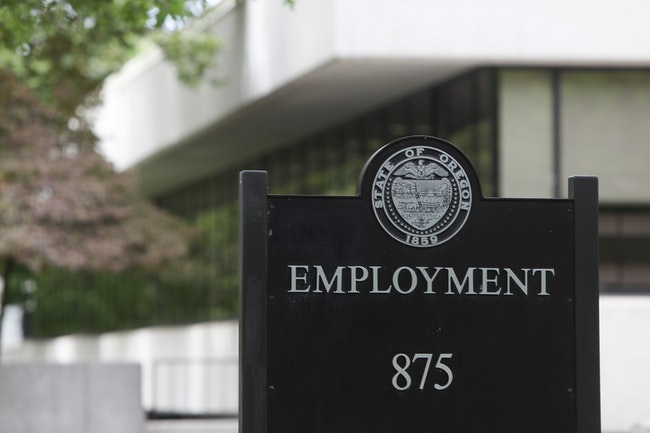 Oregon Employment Department. (Amanda Loman/Salem Reporter)
Oregon Employment Department. (Amanda Loman/Salem Reporter)
As the number of job openings in Oregon spiked to a record high this spring, so did the number of hard-to-fill vacancies lacking applicants.
Job vacancies reached 98,000 in spring 2021, the most ever recorded in the state’s history, according to a Wednesday economic update issued by the Oregon Employment Department.
Around 6,000 to 8,000 hard-to-fill job openings – around 25% – had a lack of applicants in summer 2020 and winter 2021, the employment department said. Between April and June, around 34,000 of them – nearly half – had too few or no applicants.
In a survey of private employers throughout Oregon, the employment department found the most common challenges in filling job openings – a lack of applicants or qualified candidates – remained consistent before and during the pandemic.
Employers cited Covid-related reasons as the main challenge for filling jobs only 10 to 20% of the time between summer 2020 and spring 2021, the department said. Those that reported Covid as their main challenge cited the virus, relatively high unemployment benefits or both.
In summer 2020, employers reported generous unemployment insurance benefits were the biggest barrier to filling 7% of hard-to-fill vacancies. That figure has since grown to 14%.
Employers in the leisure and hospitality industry reported the most hard-to-fill vacancies related to the pandemic, while jobs with the most non-Covid related vacancies were personal care aides, retail salespeople and restaurant cooks.
“It seems like the sheer volume of hiring taking place in recent months has had the biggest impact on businesses’ challenges finding workers,” the statement read.
The employment department said research points to factors besides enhanced unemployment benefits as hiring barriers. Among 26 states that withdrew from federal pandemic unemployment assistance in June and July, seven out of eight workers didn’t return to work after their Covid-related benefits ended for other reasons, including a lack of in-person school or available child care slots, health concerns such as the Delta variant surge, workers relocating or changing industries, and workers retiring.
The department estimated 81,000 Oregonians no longer qualify for unemployment insurance benefits after last week. Around 11,000 people in the state who were receiving pandemic emergency unemployment compensation have a deferred claim, meaning they can continue receiving regular unemployment insurance benefits without the additional weekly $300 previously offered through federal pandemic unemployment compensation.
The department partnered with WorkSource Oregon on a statewide Back To Work campaign for Sept. 15 to help people find jobs and businesses to find employees, coordinating job fairs and hiring events in 24 locations throughout the state, according to the statement.
-Ardeshir Tabrizian









